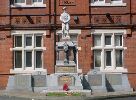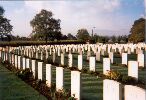
Newton-le-Willows and
Earlestown War Memorial

| OTHER WARS |
 |
Newton-le-Willows andEarlestown War Memorial |
 |
| The
Great War Roll of Honour |
|||||||||||||||||||||||||
Captain H. Whalley-Kelly, in his book “Ich Dien –
The Prince of Wales’s Volunteers”, gives the following account:
“At 6 a.m. on 25th February the advanced guard of the 13th Division commenced
to advance up the left bank of the Tigris from the Shumran Peninsula, with the
Battalion as right flank-guard. About 10.30 a.m. the advanced-guard mounted
troops (Hertfordshire Yeomanry) gained contact with the Turkish rear-guard posted
in a canal running roughly north-east from the north-west corner of the Husaini
Bend. By 12.30 p.m. the whole advanced guard was involved in a sharp encounter
action, and the Battalion was ordered to try to turn the enemy's left flank,
as the other battalions of the 38th Brigade were held up.
"After passing through the dismounted yeomanry the Battalion came under
intense machine-gun fire, and the enemy waS also putting down a thick curtain
of bombs and rifle grenades. One of the main centres of resistance appeared
to be a hill and dry watercourse on the left of the Battalion front, and these
localities were attacked by a party under Second-Lieutenant A. G. Jackson. In
the face of a veritable hail of machine-gun bullets, Jackson's party gallantly
cleared the watercourse with the bayonet after an hour's severe fighting, in
which the leader was himself killed. Private John Readitt immediately took over
command, and on his own initiative organized a further advance which drove back
the Turkish machine guns and enabled the survivors of the party to reach the
barricade the enemy had erected in the watercourse. Here a counter-attack forced
them back, but Readitt gave ground slowly, continuing to throw bombs. Shortly,
after, reinforcements arrived and the position was consolidated.
"The action of Jackson's detachment enabled the remainder of the Battalion
to effect a lodgement in a section of the Turkish trenches where, although isolated,
it maintained its position with barricades on either flank until night fell,
and the enemy withdrew. This was a day of continuous fighting, and 4 officers
and 79 other ranks were killed and wounded.
"Private Readitt
was awarded the Victoria Cross for his conspicuous bravery and fine leading.
Prior to Second-Lieutenant Jackson being killed, Private Readitt had five times
led small parties up the watercourse under machine-gun fire at very close range,
returning each time as the sole survivor. In fact, the success of tbe day's
operations on the Battalion's front largely turned on Private Readitt's devotion
to duty and determination."